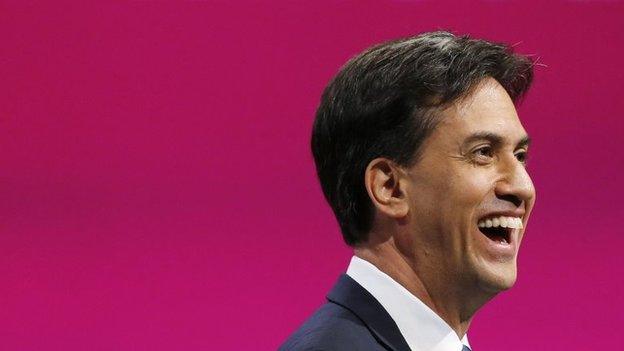Ed Miliband's conference speech: Did he get the job?
- Published

Stalin had a five year plan. Ed Miliband talked of 10 in his final party conference speech before May's general election.
And fears that he might be tending towards authoritarianism were raised when he talked of Manchester being a Tory and Lib Dem free zone.
Surely he didn't advocate one party states?
In fact, he said setting out a decade-long "route map" for Britain was a way of rebuilding trust in politics. Last year he had, as his strategists call it, a "retail offer" to voters of an energy price freeze.
This year he had to convince disillusioned voters that he had an overall direction of travel and - even if things could not be done immediately in difficult circumstances, with time and resources he would change Britain for the better.
But given that he may struggle to win a single term in Downing Street, talking about what he would do in two terms risks being seen as hubristic.
The Labour leader described the general election as a six month interview with the British people for the top job.
'Extra resources'
So how would potential employers rate him?
Well, he was ambitious. One of his national goals was to get about a third of school leavers in to apprenticeships, something he acknowledged would not be easy.
He also showed some aptitude in numeracy. Funding an expansion in NHS staff by introducing a "mansion tax" and taking what he called "extra resources" from the tobacco companies.
But was he visionary? The audience only got to its feet when he mentioned the health service, a well-worn Labour comfort blanket.
And the genuine innovation contained in the speech - integration of social care services - will not be properly unveiled until Shadow Health Secretary Andy Burnham speaks on Wednesday.
Was he trustworthy? We have to await further announcements on how he would pay for even more housing beyond 2020 and how he would help young people on to the housing ladder.
And did he show leadership qualities? Well here, aware that he often talks about domestic issues as leader of the opposition he assured us he would strain every fibre to bring a two-state solution to the Middle East. He hinted there could - with UN backing - be Labour support for air strikes in Iraq.
And he would appoint a world envoy for lesbian and gay rights - the former actor and MEP Michael, soon to be Lord, Cashman.
'Together'
Oh and while he might not be as steely-tough as Uncle Joe Stalin, he did point out how he had stood up to vested interests from Rupert Murdoch to the Daily Mail.
His initial presentation to the interview panel also tried to set out how he would be different from the other applicant, David Cameron (something you don't normally get to do in a real job interview, as he acknowledged).
Borrowing half of the winning 'Better Together' slogan from the Scottish referendum, he said Labour's values could be summed up in just one word: "together".
He used the word 50 times during his speech. The Conservatives by contrast, he said, would leave you on your own.
So a solid speech but as one strategist said 'there was no jaw dropping moment like last year's energy price freeze. That wasn't the intention.
But while the content of his speech would be popular with Labour voters, Mr Miliband is not yet such a shoo-in as the next prime minister that he can abandon the "sit up and listen to me" approach that might be necessary to stimulate the interest of the less politically-engaged sections of the electorate.
Indeed Elizabeth, a young apprentice auto electrician, paraded by Miliband on the floor of conference, said she was keeping "an open mind" on how she would vote.
If Ed Miliband really were Stalin she would be serving her apprenticeship in the salt mines of Siberia.